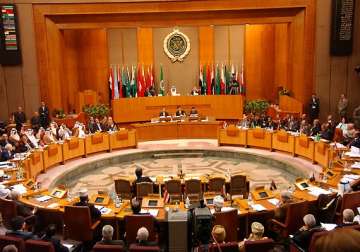Cairo, Nov 12 : The Arab League suspended Syria today until President Bashar al-Assad implements an Arab deal to end violence against protesters, and called for sanctions and transition talks with the opposition. Syrian envoy Yussef Ahmad angrily denounced the move as illegal, saying Damascus had already implemented the deal and claiming the United States had ordered the suspension.
He also charged the League was trying to “provoke foreign intervention in Syria, as was the case in Libya.” A statement, read by Qatari Prime Minister Hamad bin Jassem Al-Thani, said the League decided “to suspend Syrian delegations' activities in Arab League meetings” and to implement “economic and political sanctions” against Damascus. In a move which an EU spokesman said the bloc “fully” backs, Sheikh Hamad said the suspension will last “until the total implementation (by Syria) of the Arab plan for resolving the crisis accepted by Damascus on November 2.” But Ahmad told a Cairo press conference that Damascus had “implemented all the articles of the agreement,” even though at least 125 people have reportedly been killed in the flashpoint city of Homs alone since the deal was inked. “It was clear (the decision) was decided through a US order,” he said, accusing the League of working for an “American agenda.”
Ahmad also said the moves decided by League foreign ministers in a vote of 18-3, with one abstention, “put an end to joint Arab action and show that the (League's) administration is subjected to US and Western agendas.” Apart from the suspension, which had been sought by the Syrian opposition, the League called for the withdrawal of Arab ambassadors from Damascus but left the decision to each member state.
Sheikh Hamad said the measures would take effect on Wednesday, and that Arab ministers would meet again to decide on specific sanctions.The statement also called for the protection of civilians and said League chief Nabil al-Arabi would contact international organisations, including the United Nations, if the bloodshed continued.
It called for a meeting in Cairo with Syrian opposition groups in three days to “agree a unified vision for the coming transitional period in Syria.” The the opposition would later meet with Arab foreign ministers.
A week of deadly violence in city of Homs overshadowed the meeting, in which ministers had appeared divided on what measures to take.Syria, Lebanon and Yemen voted against the decision, and Iraq abstained.
Under the deal, Assad's regime agreed to release detainees, withdraw the army from urban areas, allow free movement for observers and media and negotiated with the opposition.Instead, human rights groups say, the regime has intensified its crackdown, especially in Homs.At least 23 people were killed in violence in Syria yesterday alone, most of them civilians in Homs, which an opposition group declared a “humanitarian disaster area”earlier this week.
Latest World News
